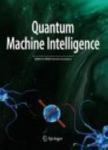版权所有:内蒙古大学图书馆 技术提供:维普资讯• 智图
内蒙古自治区呼和浩特市赛罕区大学西街235号 邮编: 010021

作者机构:NASA Ames Res Ctr Quantum Artificial Intelligence Lab QuAIL Explorat Technol Directorate Moffett Field CA 94035 USA Univ Bristol Quantum Engn CDT Bristol BS8 1TH Avon England Stinger Ghaffarian Technol Inc Greenbelt MD 20770 USA USRA Res Inst Adv Comp Sci RIACS Mountain View CA 94043 USA Nicolaus Copernicus Univ Fac Phys Astron & Informat Inst Phys Grudziadzka 5-7 PL-87100 Torun Poland
出 版 物:《QUANTUM MACHINE INTELLIGENCE》 (Quantum Mach. Intell.)
年 卷 期:2021年第3卷第1期
页 面:1-14页
核心收录:
基 金:NASA Ames Research Center NASA Advanced Exploration systems (AES) program NASA Earth Science Technology Office (ESTO) AFRL Information Directorate [F4HBKC4162G001] Office of the Director of National Intelligence (ODNI) Intelligence Advanced Research Projects Activity (IARPA) [IAA 145483] NASA Academic Mission Services [NNA16BD14C]
主 题:Variational quantum algorithms Meta-learning Optimization Quantum alternating operator ansatz Variational quantum eigensolver Long short-term memory
摘 要:Variational quantum algorithms, a class of quantum heuristics, are promising candidates for the demonstration of useful quantum computation. Finding the best way to amplify the performance of these methods on hardware is an important task. Here, we evaluate the optimization of quantum heuristics with an existing class of techniques called meta-learners. We compare the performance of a meta-learner to evolutionary strategies, L-BFGS-B and Nelder-Mead approaches, for two quantum heuristics (quantum alternating operator ansatz and variational quantum eigensolver), on three problems, in three simulation environments. We show that the meta-learner comes near to the global optima more frequently than all other optimizers we tested in a noisy parameter setting environment. We also find that the meta-learner is generally more resistant to noise, for example, seeing a smaller reduction in performance in Noisy and Sampling environments, and performs better on average by a gain metric than its closest comparable competitor L-BFGS-B. Finally, we present evidence that indicates the meta-learner trained on small problems will generalize to larger problems. These results are an important indication that meta-learning and associated machine learning methods will be integral to the useful application of noisy near-term quantum computers.